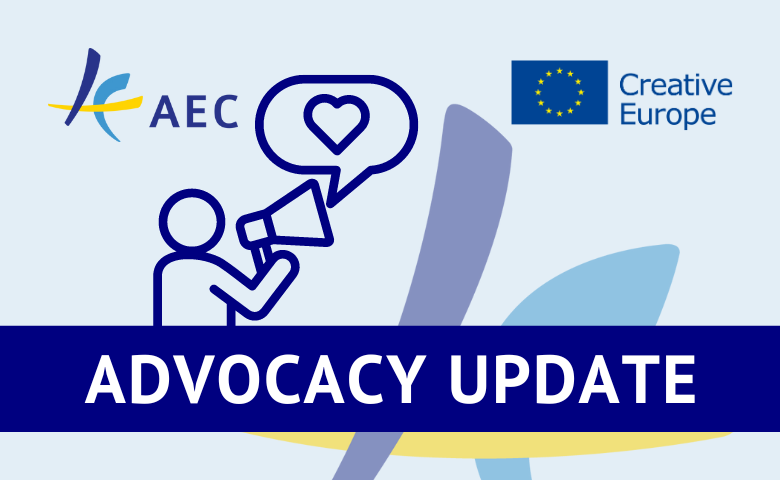AEC takes part in the evaluation of Creative Europe and calls for increased funding and a closer connection between the cultural and creative sector and higher music education.
The Creative Europe programme 2021-2027 of the European Union has a budget of € 2.44 billion, compared to €1.47 billion of the previous programme (2014-2020). For 10 years Creative Europe has invested in European creativity through actions that reinforce cultural diversity and respond to the needs and challenges of the cultural and creative sectors.
The main objectives of the programme are to
- safeguard, develop and promote European cultural and linguistic diversity and heritage
- increase the competitiveness and economic potential of the cultural and creative sectors, in particular the audiovisual sector
AEC has benefited from the programme since its introduction in 2014 through the projects Full Score, SMS and ARTEMIS.
The Creative Europe programme is now being evaluated to ensure that it also in future iterations contributes to the current needs of the sector. As part of the procedure, the Cultural and Creative Sector (CCS) was invited to participate and so also the AEC. The evaluation took the form of a questionnaire addressing several important questions including wishes for future versions of the programme.
In its remarks, the AEC underlined the importance of maintaining and enhancing the following successful funding strands.
Cooperation projects, Networks, Culture Moves Europe, and platforms all play essential roles in fostering intercultural dialogue, promoting cultural diversity, and strengthening the cultural and creative sectors. These initiatives serve different audiences and allow cultural organisations and individuals across Europe to engage in a broad range of EU-funded cultural activities. To include and support the next generation of artists, it is crucial to maintain, strengthen, and expand these funding strands in the next iteration of the programme. By doing so, we can ensure that emerging artists have access to the resources and networks they need to thrive, while also providing pathways to formal education that will equip them with the skills necessary to contribute meaningfully to the sector’s future.
Further, the AEC has pointed out the need for better connections between music creation and music education.
The cultural and creative sectors have proven their significant value in driving social and economic development, as well as in promoting peace and mutual understanding. Creative Europe projects have demonstrated how these goals can be achieved through strategic support. Yet, to truly unlock the potential of the next generation of professional artists, greater emphasis must be placed on capacity building, particularly by forging stronger links between music creation and formal education including higher music education.
Finally, AEC has addressed several challenges of the current programme that should be solved in the future.
First and foremost, the high demand and application numbers for Creative Europe demonstrate the programme’s vital role in the cultural sector. Unfortunately, this has had the consequence that an ever smaller proportion of the applications have been successful. It is essential that future iterations of Creative Europe receive increased funding.
Secondly, AEC fully supports the goal of increasing sustainability within the culture sector, recognising the potential of music and the arts to drive action on climate change. However, sustainability measures must be designed to build capacity and support learning, rather than create barriers to participation. Creative Europe should prioritise funding for initiatives that help institutions and artists implement sustainable practices without restricting access based on their current ability to meet environmental standards. This will enable long-term structural shifts that promote sustainability across the sector.
Finally, the rapid advancement of AI technologies offers significant opportunities for the cultural and creative sectors. However, the rights of creators must be protected, particularly as generative AI systems rely on copyrighted materials for which artists are not fairly compensated. Legal frameworks, such as the Copyright Directive and AI Act, must be updated to ensure that artists’ rights are safeguarded, and policymakers need to be mindful of the impact AI will have on cultural diversity.
The EU Commission is expected to finalise the evaluation of the Creative Europe Programme by the end of 2024, and AEC will follow up on the result, as it will have a significant influence on the future budget of the programme and thus on its ability to support and strengthen our sector.






